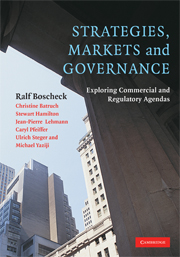17 - Addressing the market paradox
Published online by Cambridge University Press: 06 July 2010
Summary
The question is: what are the values that are built into the dominant contemporary economic theories that specialists generate, managers and policymakers use, popular movements turn into slogans, ethicists try to investigate and philosophers and theologians seek to understand and subject to normative criticism?
Max L. Stackhouse, Princeton Theological SeminaryDealing with governance concerns at the firm, industry and international level, the chapters included in this volume shed light on the benefits and limits of market-based coordination. Structural conditions permitting, markets are recognized to be efficient in allocating resources and stimulating their adept and innovative use as long as market participants pursue their self-interest. At the same time, for markets to work, strategic behavior, in its modern, Websterian definition, may be problematic as the pursuit of interest should not extend to forms of opportunistic behavior, misrepresentation and guile. In other words, market coordination requires the vigorous pursuit and clear limitation of self-interest. To deal constructively with this apparent market paradox, successful, capitalist economies rely on habits and behavioral norms to buttress more formal institutions in sustaining system trusts and dependable, decentralized coordination. Conversely, institutional deficiencies cause market failures, legitimacy concerns and the loss of faith in economic and even political liberties; they are ultimately linked to economic backwardness. While, none of this is new, its importance is often not recognized by both proponents and critics of market-driven life.
- Type
- Chapter
- Information
- Strategies, Markets and GovernanceExploring Commercial and Regulatory Agendas, pp. 321 - 328Publisher: Cambridge University PressPrint publication year: 2008

